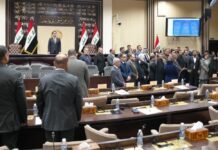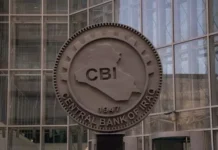The prominent figure, Muhammad Hassan Al-Saadi, has returned to take charge of Iraq’s economic movement. However, Washington is also making its presence felt by asserting its leadership position in the game. It is evident that the people are well aware of the power dynamics at play and who is controlling the rounds of the match.
At times, we witness the Iraqi government expressing satisfaction with the performance of the US Federal Bank and their economic dealings with the World Bank. However, at other times, the government imposes new controls to regulate the movement of the dollar and announces punitive measures against private banks in Iraq that violate regulations in the local currency market.
Washington’s current stance is that Iraq is not complying with the Federal Bank’s regulations to restrict the illegal flow of dollars abroad, particularly to Iran, which is facing strict American sanctions. The US government believes that Baghdad has not taken necessary measures to curb currency smuggling, whether it originates from the Kurdistan region or other outlets linked to neighboring Iran.
Despite the Sudanese government’s efforts to prevent the smuggling of dollars abroad, control the internal market, and encourage the use of dinar in daily commercial transactions, Iraq continues to pursue traders and smugglers to curb the smuggling. However, these efforts have proven to be inadequate. In response to this, there has been an increase in the smuggling of currencies other than the dollar, such as the euro, Chinese yuan, and Emirati dirham. This is an attempt to reduce the demand for the dollar, diversify the traded currencies and provide support for Iraq’s foreign dealings.
Despite the Central Bank of Iraq taking numerous measures, it still lacks a mechanism to control the movement of the dollar in the market. Its reform steps have failed to control the exchange rate and have led to an exacerbation of the crisis and a decline in confidence between Iraq and the World Bank. As a result, the World Bank has taken strict measures towards international transaction requests coming from Iraq. Many of these requests were rejected under the pretext of not conforming to international economic dealing standards. Additionally, a number of banks have been included on the blacklist due to suspected unlicensed cash transactions.
The Central Bank of Iraq’s wrong monetary policy would have a negative impact on the financial reality of the country, highlighting the primitiveness of the financial system and its lack of modern means of financial dealing. Additionally, crime mafias have control over the internal Iraqi market and the movement of the dollar within it. The current government plans to control the dollar’s flow to achieve economic development and stabilize the dinar’s value by expanding its commercial uses and preventing smuggling, storage, or manipulation of its prices.
The positive aspect of the recent decision is to reduce the influence of the dollar on the Iraqi market. The aim is to limit its circulation and restore the prestige of the dinar, thereby giving it control over the internal market, at least. This presents an important opportunity to restore the dinar’s former prestige and restrict the dollar to foreign transactions only. The decision is also positive because it will put an end to traders’ control over the internal market and prevent the manipulation of the livelihoods of ordinary citizens.
Iraq is considering joining the BRICS bloc, with the aim of reducing its reliance on the US dollar. There is a growing acceptance among Iraqi citizens to use the Iraqi dinar in their financial transactions. The BRICS summit is expected to take place in Cape Town, South Africa, in August 2023, and 19 countries have already submitted official requests to join the alliance. This move could potentially damage the value of the dollar and its future prospects, as the BRICS currency is expected to be strong and competitive. Although the BRICS currency has not been issued yet, its emergence could signal the decline of the US dollar.





